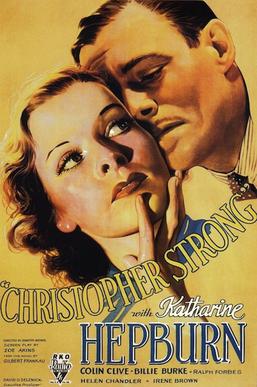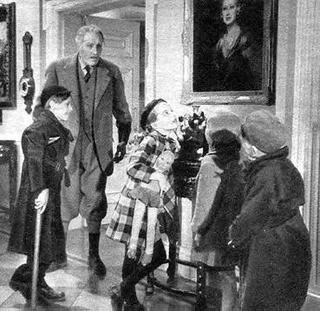The Forsyte Saga, first published under that title in 1922, is a series of three novels and two interludes published between 1906 and 1921 by the English author John Galsworthy, who won the 1932 Nobel Prize in Literature. They chronicle the vicissitudes of the leading members of a large upper-middle-class English family that is similar to Galsworthy's. Only a few generations removed from their farmer ancestors, its members are keenly aware of their status as "new money". The main character, the solicitor and connoisseur Soames Forsyte, sees himself as a "man of property" by virtue of his ability to accumulate material possessions, but that does not succeed in bringing him pleasure.

Christopher Strong is a 1933 American pre-Code romantic drama film produced by RKO and directed by Dorothy Arzner. It is a tale of illicit love among the English aristocracy and stars Colin Clive and Katharine Hepburn. The screenplay by Zoë Akins is an adaptation of the 1932 British novel Christopher Strong by Gilbert Frankau.

The Rise of Silas Lapham is a realist novel by William Dean Howells published in 1885. The story follows the materialistic rise of Silas Lapham from rags to riches, and his ensuing moral susceptibility. Silas earns a fortune in the paint business, but he lacks social standards, which he tries to attain through his daughter's marriage into the aristocratic Corey family. Silas' morality does not fail him. He loses his money but makes the right moral decision when his partner proposes the unethical selling of the mills to English settlers.

Garbo Talks is a 1984 American comedy-drama film directed by Sidney Lumet and starring Anne Bancroft, Ron Silver, and Carrie Fisher, with an uncredited appearance by Betty Comden as Greta Garbo.

Chloe Richards is a fictional character from the Australian television soap opera Home and Away, played by Kristy Wright. She debuted on-screen during the episode airing on 28 June 1995. Chloe left in 1999, making a short return stint in 2005 when she died from the resulting injuries of a car crash. Chloe has relationships with Jack Wilson, Curtis Reed, Lachlan Fraser, James Fraser and Jesse McGregor.
Why Did I Get Married? is a 2003 American stage play created, written, produced and directed by Tyler Perry. It originally starred Kelly Price as Sheila and LaVan Davis as Poppy. The live performance, featuring Cheryl Pepsii Riley, released on DVD on June 27, 2006 was recorded live in Atlanta at The Ferst Center for the Arts at Georgia Institute of Technology in December 2005. It was released on DVD alongside Madea Goes to Jail and Madea's Family Reunion.

Medal for the General is a 1944 British comedy film directed by Maurice Elvey. The screenplay by Elizabeth Baron is based on the novel of the same title by James Ronald.

The Forsyte Saga is a British drama television serial that chronicles the lives of three generations of an upper-middle-class family from the 1870s to 1920s. It was based on the books of John Galsworthy's trilogy The Forsyte Saga, which were adapted by Granada Television for the ITV network in 2002 and 2003. Additional funding was provided by American PBS station WGBH, as the 1967 BBC version had been a success on PBS in the early 1970s.

Kipps is a 1941 British comedy-drama film adaptation of H. G. Wells's 1905 novel of the same name. The film was directed by Carol Reed and stars Michael Redgrave as a draper's assistant who inherits a large fortune. The film's costumes were designed by Cecil Beaton.

Splendor is a young adult novel by Anna Godbersen in The Luxe series. The book is the fourth and final book in the series, and was published on October 27, 2009.

Between Us Girls is a 1942 American drama film directed by Henry Koster and starring Diana Barrymore, Kay Francis, Robert Cummings, John Boles, Andy Devine, and Scotty Beckett.

Behold My Wife! is a 1934 drama film directed by Mitchell Leisen. It stars Sylvia Sidney and Gene Raymond. Based on a novel by Sir Gilbert Parker, The Translation of a Savage, the story had been filmed before in the silent era in 1920 as Behold My Wife! starring Mabel Julienne Scott and Milton Sills. One of the plot's themes is a white man's romance and eventual marriage to an Apache woman.

Passing On is a novel written by Penelope Lively and published in 1989. It tells the sensitive and intimate story of how a brother and sister’s lives change after their imperious mother dies. The story is set in the South of England in the late eighties.
"Crying Wolf" is the 14th episode of the second season of The CW television series The Vampire Diaries, and the 36th episode of the series overall. It originally aired on February 10, 2011. The episode was written by Brian Young and directed by David Von Ancken.
"The Dinner Party" is the 15th episode of the second season of The CW television series, The Vampire Diaries and the 37th episode of the series overall. It originally aired on February 17, 2011. The episode was written by Andrew Chambliss and directed by Marcos Siega.

Human Voices is a 1980 novel by the British author Penelope Fitzgerald. It relates the fictionalised experiences of a group of BBC employees at Broadcasting House, London, in 1940 when the city was under nightly attack from the Luftwaffe's high explosive, incendiary, and parachute bombs.

"Chapter Thirty-One: A Night to Remember" is the eighteenth episode of the second season of the American television series Riverdale and the thirty-first episode of the series overall. The episode was directed by Jason Stone and written by Arabella Anderson and Tessa Leigh Williams and choreographed by Heather Laura Gray. It centered around the stage musical Carrie by Lawrence D. Cohen and Michael Gore, which is based on the 1974 book of the same name by Stephen King.

Bella Nixon is a fictional character from the Australian television soap opera Home and Away, played by Courtney Miller. The actress previously appeared in the serial as an extra. When the part of Bella came up, Miller felt a strong connection to the character and storyline. She was cast in June 2018 and Home and Away marks her first major television role. She made her first appearance during the episode broadcast on 26 November 2018. The character was introduced as the younger half-sister of Colby Thorne and she received several on-screen mentions as part of his early storylines. Bella's fictional backstory establishes that she and her mother were taken away by her father Ross Nixon when she was young. Bella is portrayed as sheltered, but independent and feisty. Miller found herself being able to live out her rebellious side through her, and she uses her qualifications in psychology and rehabilitation counselling to help her portray Bella's feelings.













